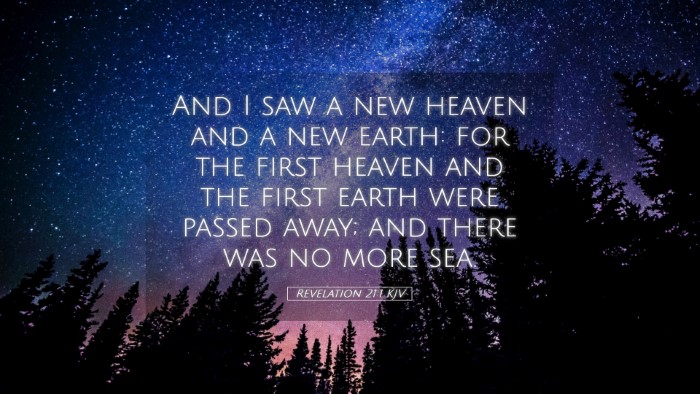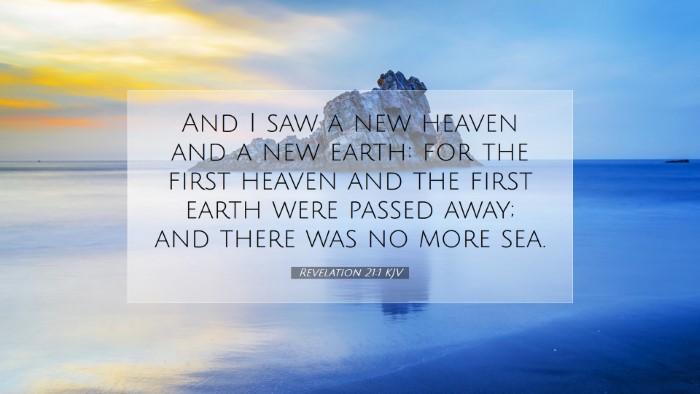Commentary on Revelation 21:1
Verse: "And I saw a new heaven and a new earth: for the first heaven and the first earth were passed away; and there was no more sea."
Introduction
The verse from Revelation 21:1 brings forth a profound proclamation of renewal and transformation, encapsulating the hope and promise of God’s ultimate plan for creation. In this commentary, we will explore insights from various public domain sources, such as Matthew Henry, Albert Barnes, and Adam Clarke, to elucidate the significance of this passage for pastors, theologians, and scholars alike.
The New Heaven and New Earth
Revelation 21:1 introduces the concept of a "new heaven and a new earth." This dramatic shift signifies the end of the former order, which is marred by sin, suffering, and decay. Matthew Henry explains that this new creation is a fulfillment of God’s promises and a demonstration of His power to renew what has been tarnished by fallibility.
- Transformation of Creation: The destruction of the old heavens and earth is not merely about obliteration but serves a purpose of purification. Adam Clarke emphasizes that the new creation will be free from the taint of sin and its consequences.
- Theological Implications: The new creation reflects God’s ultimate sovereignty. Albert Barnes points out that the renewal of the cosmos is a testament to God's unshakeable plan for redemption and the restoration of His creation to its intended glory.
Contrast With the Old Creation
The phrase "for the first heaven and the first earth were passed away" indicates a complete transformation. It is essential to grasp what 'passed away' signifies. Matthew Henry reminds us that this does not imply annihilation in totality but completion, as all things come under the dominion of God.
- Absence of Suffering: The characterization of the new creation provides great hope to believers. Adam Clarke notes that in the new heaven and earth, there will be no presence of sin, sorrow, or separation from God, aligning with the ultimate desire of humanity for peace and happiness.
- Concept of 'No More Sea': The phrase "there was no more sea" could be interpreted through various lenses. Albert Barnes suggests that the sea often symbolizes chaos and agitation in biblical literature. The absence of the sea points to a state of peace and stability in the new order.
Theological Reflections
This verse invites reflection on eschatological themes, tying into the broader narrative of God's redemptive work throughout history.
- Hope for Believers: The vision of the new creation serves as a source of encouragement. The faithful are assured that their struggles and trials are temporary, and a glorious future is secured for them. Matthew Henry articulates this hope as a vital component of Christian faith.
- Invitation to Transformation: The promise of a new heaven and earth also calls for believers to live transformed lives in anticipation of this reality. Adam Clarke urges believers to reflect this hope in their daily conduct, cultivating holiness and purity.
The Vision of John
It is crucial to understand the context in which John receives this revelation. The apostle was exiled and faced persecution, and witnessing this vision signifies a divine reassurance. Henry’s commentary reflects that such a vision would have offered immense consolation and reaffirmation to early Christians undergoing tribulations.
Literary Structure and Symbolism
Understanding Revelation 21:1 involves recognizing its literary elements. The imagery employed is rich with symbolism. Albert Barnes notes that the new heaven and earth represent more than physical places; they embody God's presence and fellowship with His people. This eschatological vision resonates through biblical prophetic literature, calling back to promises found in Isaiah 65:17-19.
Conclusion
Revelation 21:1 ushers the reader into a powerful vision of hope, renewal, and divine promise. The combined insights from Matthew Henry, Adam Clarke, and Albert Barnes create a multifaceted understanding of this significant scripture, encouraging scholars and believers to explore the depths of God's redemptive narrative. As we await the fulfillment of this promise, may we remain steadfast in faith, embodying the hope of the new creation in our lives.


